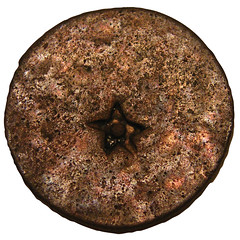
PREV ARTICLE
NEXT ARTICLE
FULL ISSUE
PREV FULL ISSUE
NUMISMATIST ARTICLE DISCUSSES 1817 TEXAS JOLA COINS
At my request Barbara Gregory, Editor-In-Chief of The Numismatist, the official publication of the American Numismatic Association forward me a copy of an article in the May 2011 issue by James Bevill and Alvin Stern with new information about the enigmatic 1817 half real coins. Also known as "jolas", these rare coins struck in 1817 and 1818 hold an important place in the numismatic history of the U.S. , but are often overlooked by collectors who don't realize that it wasn't only the New England states that had circulating coinage in areas that later became part of the U.S. Here are a few key paragraphs and an image of the 1817 jola from the article.
-Editor


Numismatists who study the U.S. colonial coin series credit the small, copper ½-real pieces known as the jolas of New Spain (Texas) as the first appearance of the Lone Star symbol for Texas. These jolas were struck in 1817 and 1818. The 1818 jolas are exceedingly rare in their own right, but the recent discovery of six examples of 1817 jolas bearing the Lone Star symbol sheds new light on this short-lived, but historically significant series. The first widely published images of the 1817 coins appeared in James Bevill's 2009 book, ¬Paper Republic: The Struggle for Money, Credit and Independence in the Republic of Texas. Minted in San Antonio de Béxar in 1817-18, ¬jolas are the only Spanish coins known to have been struck in what now is the United States. The Republic of Texas ¬existed as an independent ¬nation for 10 years, and its boundaries included parts of present-day Oklahoma, Kansas, New Mexico, Colorado and Wyoming. Texas ceased to be an independent nation in early 1846. Unlike the original 13 colonies, it had never been under British rule, having been settled under the flags of Spain and Mexico prior to winning independence during the violent Texas Revolution of 1835-36. When jolas were struck for use in regional commerce, Texas was a northern province of Nueva España (New Spain). In 1817 acting Spanish Governor Manuel Pardo received authorization from Mexico City to strike small copper coinage to facilitate commerce. He selected Manuel Barrera, a ¬local merchant and administrator, to produce 8,000 jolas. There is ¬irrefutable written evidence in the original Béxar archives that the Barrera coins were released into circulation in San Fernando de Béxar on or about March 29, 1817. Only six specimens of the 1817 jolas struck for circulation and bearing the Lone Star reverse are known today. Although mintage of 8,000 coins was authorized, it is not known how many were struck. All six measure 18mm in diameter, have the fraction rotated to the right, and weigh -between 1.3g and 1.6g. There is only one die variety, in which each coin exhibits a series of ridges on the periphery of the obverse. Curiously, no bar separates the numbers in the fractional denomination.
The 1817 jolas are so rare that they constitute
a one-year type in a two-year series. If authenticated, they represent the first circulating coins struck in Texas, or in any of the former Spanish Territories (1810-21) or Mexican areas (1821-48) presently located in the United States. The little jolas, coined while Texas was still known as
New Spain, left a lasting imprint of the Lone Star that became, and will forever be, a unique symbol of Texas.
The Numismatic Bibliomania Society is a non-profit organization promoting numismatic literature. See our web site at coinbooks.org. To submit items for publication in The E-Sylum, write to the Editor at this address: whomren@gmail.com To subscribe go to: https://my.binhost.com/lists/listinfo/esylum All Rights Reserved. NBS Home Page Contact the NBS webmaster 
|